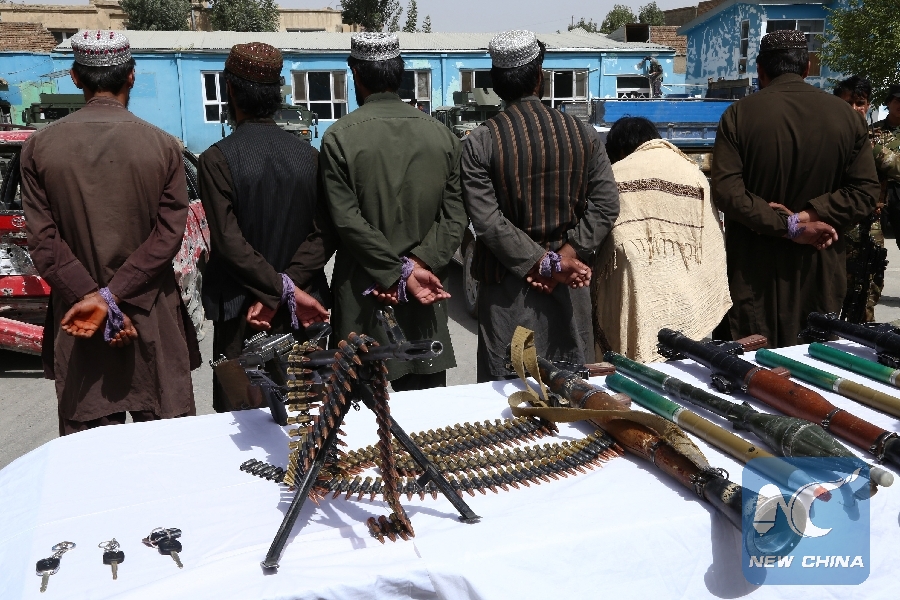
File Photo: Taliban militants stand hand cuffed after being captured by Afghan security force members in Ghazni province, Afghanistan, Sept. 1, 2018. (Xinhua/Sayed Mominzadah)
UNITED NATIONS, Dec. 17 (Xinhua) -- The top UN envoy for Afghanistan on Monday saw a real chance of formal peace talks between the Afghan government and the Taliban.
"The possibility of a negotiated end to the conflict has never been more real in the past 17 years than it is now," Tadamichi Yamamoto, the UN secretary-general's special representative for Afghanistan, told the Security Council.
He saw political will on the side of the Afghan government and continued international support.
"On the Afghan side, a peace plan was presented by President (Mohammad Ashraf) Ghani at the Geneva Ministerial Conference (on Nov. 28). A team to negotiate directly with the Taliban was appointed. A senior peace advisory board representing a broader set of Afghan politicians to support the peace efforts was also announced. On Dec. 9, a new head of the Secretariat of the High Peace Council was appointed," said Yamamoto, who is also head of the UN Assistance Mission in Afghanistan.
A key outcome of the Geneva Ministerial was the assurance of continued international support in the post-peace phase. The international community expressed their commitment to continue providing assistance to Afghanistan in the event that a peace agreement is reached with the Taliban, he said.
"In this forum I have frequently spoken of the need to move from sporadic contacts to structured, formal talks. The efforts are under way to bring about this change."
He called on the warring parties to take action to build trust.
While fighting and talking is often a reality in the initial stages of a peace process, it is also the case that actions on the battlefield can have an impact on progress in any peace process, he warned. "I would therefore urge all parties to the conflict to consider carefully how they can reduce the levels of violence, in particular, the harm to civilians. I urge all those to foster trust and enable dialogues to take place."
He called on the countries in the region, in particular, to contribute to creating an environment conducive to peace talks, allowing the people of Afghanistan to resolve their internal differences through negotiations.
"By moving from contacts to talks, we can begin to move from a logic of war to one focused on opportunities for peace. With this shift, we can begin to envisage the benefits of stable Afghanistan in the middle of a region full of promise and a potential for growth, rather than continue to fear threats emanating from an unstable Afghanistan."
Yamamoto also saw signs of Afghanistan taking up more security responsibilities in October's parliamentary elections.
Compared with the parliamentary elections in 2005, where 550 international experts were involved, this year's elections saw only 60 international experts participate in an advisory capacity.
There were more than 108 verified incidents causing 400 civilian casualties, the largest number of casualties on a single election day since systematic records were kept in 2009, said the envoy.
At the same time, it must be recognized that the total number of civilian casualties throughout the electoral period this year was on a par with those in 2014. "We need to acknowledge the efforts of the national security forces who managed the security primarily by themselves this year without the significant international support which they had in 2014," said Yamamoto.
More broadly on security, he said there were over 8,000 civilian casualties in the first nine months of 2018, at the same level as last year. Child casualties remain high with 2,136 recorded in the same period.
Despite progress on economic reforms, the country remains one of the world's poorest, and it is blighted by climate change. Of most immediate concern are people struck by drought and violence, and the suffering of 4.5 million people needs to be alleviated, he said.
He asked for financial support from the international community for the UN Humanitarian Response Plan for Afghanistan, which costs 612 million U.S. dollars for 2019.

